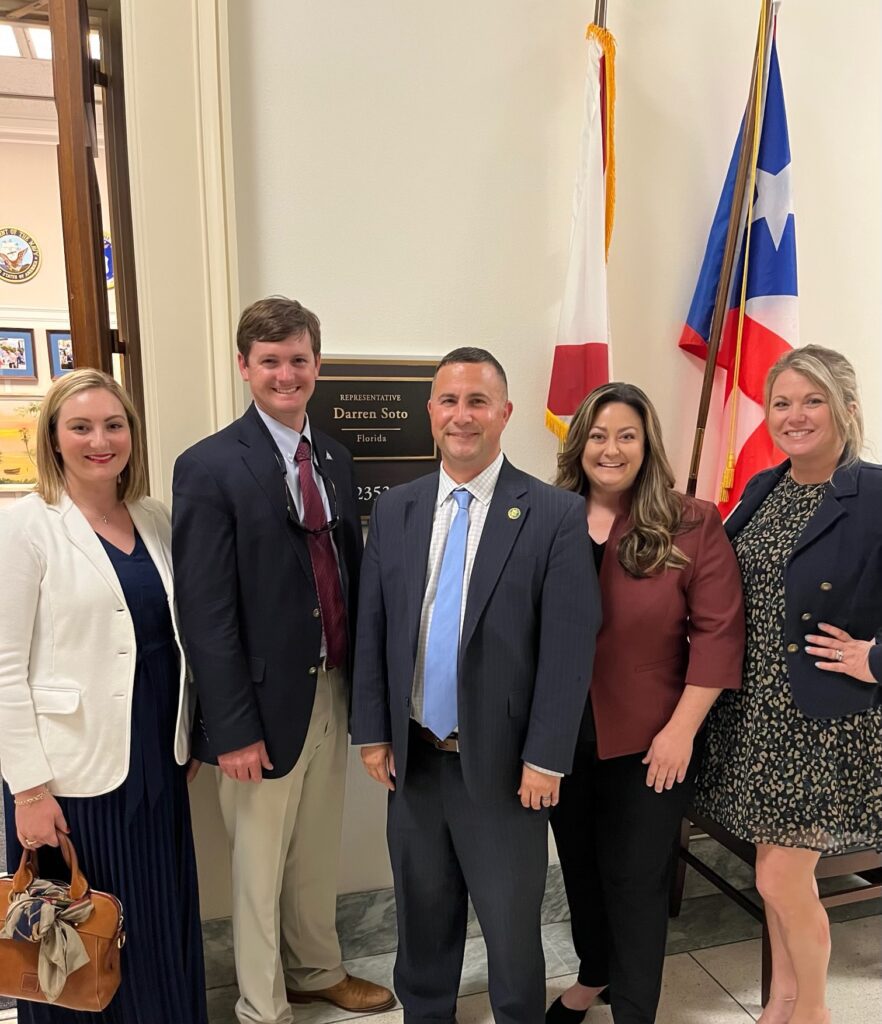Christian Spinosa, Other Ag Leaders Discuss Top Issues With Lawmakers
by PAUL CATALA
Fifth-generation Florida citrus grower Christian Spinosa was one of more than 80 Florida Farm Bureau grassroots members who traveled to Washington, D.C., to advocate for agriculture in the U.S. Capitol.
From April 18 to 20, Spinosa and other Florida Farm Bureau leaders, county Farm Bureau presidents, and members of the Young Farmers & Ranchers Leadership Group engaged with U.S. legislators and discussed vital issues that impact today’s Florida farms. Among the top priority topics was the 2023 Farm Bill, farm labor, trade and disaster relief funding.
As part of what was called the “Florida Farm Bureau Field to the Hill Trip,” Spinosa represented the Polk County Farm Bureau, which has about 4,100 members and like the Florida Farm Bureau, works to increase the net income of farmers and ranchers while improving the quality of rural life. The Florida Farm Bureau is the state’s largest general agricultural organization, representing more than 132,000 member-families.
Spinosa, 32, is the vice-president for his family company, Dudley Putnam Inc., which has been a Bartow-based Polk County citrus caretaking company for more than 70 years. Dudley Putnam caretakes about 1,000 acres of citrus in Polk County and also manages cattle and hay in Polk, Highlands and Hardee counties.
In addition, Spinosa has been on the Florida Citrus Mutual board since 2021.
Joining Spinosa on the trip was his wife, Sarah; Polk County Farm Bureau President Leigh Ann Wynn, and Kateland Raney.
The various forums at Field to the Hill were moderated by Florida Farm Bureau members.
Spinosa says the national Farm Bill, which was enacted into law in 2018 and expires this September, was at the top of the list of topics discussed. That bill is renewed every five years and is a single document accepted in a single vote by the legislature to put different measures into one bill that governs nutrition, crop insurance, conservation, rural investment, land access, and other agriculture-related activities. One of those is the United States Department of Agriculture’s funding for agencies such as its Farm Service Agency, which initiates agricultural policy and administers credit and loan programs while managing conservation, commodity, disaster and farm marketing programs through network offices across the U.S.
Spinosa, a 2013 Clemson University graduate in agriculture mechanization and business, says the block-grant legislation will particularly help farmers and citrus growers with recovery programs in the event of natural disasters. He cites recent freezes in Texas, tornadoes in Kansas, wildfires in California, and hurricanes in Florida as examples of those disasters.
Instead of having to create new programs in the event of those circumstances, Spinosa says the Farm Bill, once written, will help those producers get funding.
“If it’s not a hurricane through Florida, then the next year it’s tornadoes in Kansas, then it’s wildfires out west,” he says. “There’s something every year, so instead of having a useless program where you’re going through legislation every year, while the Farm Bill is open — it’s only open every four to five years — we’re trying to get a permanent program written so the playbook is already written and any time we have a disaster, all we’d be asking for is for Congress to fund the program,” Spinosa says.
Labor was also a key priority at the event — more specifically, U.S. Citizenship and Immigration Services’ H-2A program, which allows U.S. employers or agents who meet specific regulatory requirements to bring foreign nationals to the U.S. to fill temporary agricultural jobs. Florida Citrus Mutual estimates more than 95 percent of the Florida citrus crop is harvested by H-2A workers.
Spinosa says discussions included ways to determine labor rates and ways for producers to afford them. He says they also discussed ways to distill the notion H2A workers take jobs away from native-born Americans.
“We don’t have a line of (U.S.-born) people who want to come out and pick fruit, and that’s the problem,” Spinosa says.
“We can’t get domestic help so we’re having to depend on this H-2A program. We were relaying that mindset to our legislators so they’ll understand the importance of ensuring we’ll always have a labor force to harvest crops,” he says.
Spinosa encouraged U.S. Reps. Scott Franklin, Laurel Lee, Darren Soto, and Daniel Webster to maintain open lines of communication and make sure protocols are being followed to allow the state’s agriculture industry to flourish and grow.
“We asked, ‘What can we do for y’all in the district to make sure we’re doing everything right?’ ” he says. “Everyone loves coming to see different parts of the ag industry. They call us, and we set up farm tours to show them what’s going on. The (legislators) all have a very good mindset of what’s going on, asked questions, and were very engaged; it was all very good conversation.”
Spinosa says on the last day of the Field to the Hill trip, they met with USDA officials. He says positive comments were made specifically about Florida FSA. By Thursday morning, there was discussion regarding Florida’s agricultural advocacy.
“It just shows the issues we were raising were being discussed. It gives us a sign of effectiveness.”

